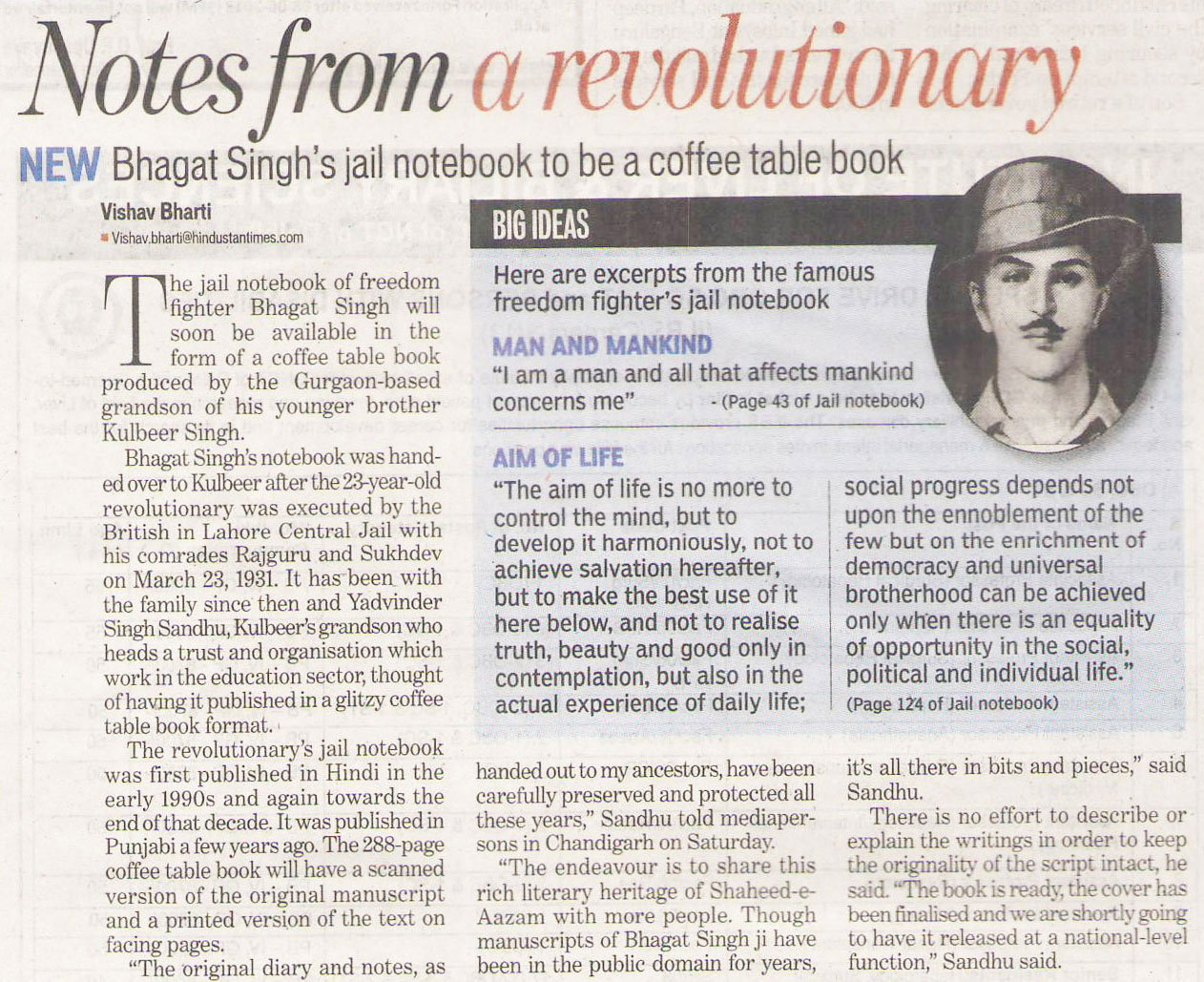Bhagat Singh's Jail Notebook: A Coffee Table Book of a Revolutionary's Legacy
The legacy of Bhagat Singh, one of India's most celebrated freedom fighters, is set to reach a broader audience with the upcoming release of a coffee table book featuring his jail notebook. This project has been undertaken by Yadvinder Singh Sandhu, the grandson of Kulbeer Singh, Bhagat Singh’s younger brother, who resides in Gurgaon. This initiative promises to offer a new perspective on the thoughts and ideas of the revolutionary, preserving them in a visually appealing and accessible format.

A Historical Treasure
Bhagat Singh’s notebook, a treasure trove of his thoughts and reflections, was handed over to Kulbeer Singh after the 23-year-old revolutionary was executed by the British on March 23, 1931, in Lahore Central Jail alongside his comrades Rajguru and Sukhdev. Since then, the notebook has been carefully preserved by the family. Recognizing its historical and literary value, Yadvinder Singh Sandhu decided to publish it as a coffee table book, making it accessible to a wider audience.
Previous Publications and the New Edition
The notebook was first published in Hindi in the early 1990s and again later that decade. It was also published in Punjabi a few years ago. However, these editions were more traditional and did not capture the visual appeal and accessibility that a coffee table book can offer. The new 288-page edition will feature a scanned version of the original manuscript on one page, with a printed version of the text on the facing page, allowing readers to appreciate the authenticity of Bhagat Singh's handwriting while following the text easily.
Preservation and Presentation
“The original diary and notes, as handed out to my ancestors, have been carefully preserved and protected all these years,” Sandhu told media persons in Chandigarh. This careful preservation has ensured that the notebook remains intact, allowing for a faithful reproduction in the new edition. Sandhu emphasized the importance of sharing this rich literary heritage with a broader audience. "Though manuscripts of Bhagat Singh ji have been in the public domain for years, it’s all there in bits and pieces," he said. The coffee table book aims to consolidate these fragments into a coherent and visually appealing format.
Maintaining Originality
One of the key aspects of this new publication is its commitment to maintaining the originality of Bhagat Singh’s writings. There will be no additional descriptions or explanations of the text, preserving the authenticity and integrity of the revolutionary’s thoughts. "The book is ready, the cover has been finalized, and we are shortly going to have it released at a national-level function," Sandhu announced.
The Aim of Life
Among the many profound reflections found in Bhagat Singh's notebook is his philosophy on life. He wrote, “The aim of life is no more to control the mind, but to develop it harmoniously, not to achieve salvation hereafter, but to make the best use of it here below, and not to realize truth, beauty and good only in contemplation, but also in the actual experience of daily life; social progress depends not upon the ennoblement of the few but on the enrichment of democracy and universal brotherhood can be achieved only when there is an equality of opportunity in the social, political and individual life.” This passage encapsulates Bhagat Singh's vision for a society where equality, democracy, and brotherhood are paramount.
A National Treasure
Bhagat Singh’s thoughts and writings have been a source of inspiration for generations of Indians. His unwavering commitment to India's freedom and his profound reflections on life, society, and politics continue to resonate today. By publishing his jail notebook in a coffee table book format, Yadvinder Singh Sandhu is ensuring that this invaluable piece of history is preserved and appreciated by future generations.
Educational Impact
This book is not just a collector’s item but also an educational resource. Schools, colleges, and libraries can use it to teach students about Bhagat Singh's life and ideas. The visual appeal of the coffee table book format will attract younger readers, sparking their interest in India's freedom struggle and the revolutionary ideals of Bhagat Singh.
